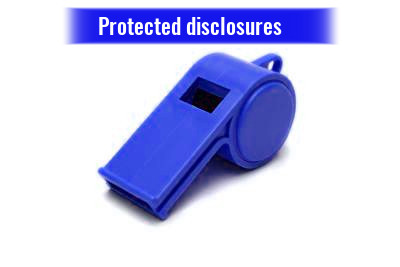Time to update your procedures in line with recent whistleblower legislation.
What you need to know about The Protected Disclosures Act 2014
UPDATE 2022
The Protected Disclosures (Amendment) Act 2022 was signed into law on 21 July 2022. It becomes effective from 1st January 2023. It updates the Protected Disclosures Act 2014, mentioned below.
The main changes introduced by the Act are:
-
The scope of the Protected Disclosutes Act 2014 is widened regarding the reporting of breaches of European Union Law.
-
Protections for shareholders, board members,volunteers, unpaid trainees and job aplicants when they make a protected disclosure.
-
Organisations with more than 50 employees are required to have policies and processes for protected disclosures.
-
A shifting of the burden of proof in penalisation cases from the employee to the employer. From 1st January 2023 the employer must prove that the alleged victimisation was not as a direct result of the employee making a disclosure under the Protected Disclosure Act 2014.
-
The Office of the Protected Disclosures Commissioner will open for business on 1st January 2023.
The Protected Disclosures Act 2014 was enacted on 15 July 2014. Its aim is to provide the best protection possible for whistleblowers in Ireland. Irish employers, in particular need to make sure that they are compliant with the act.
What does the act do?
The legislation covers all areas. It encourages employees to report “relevant wrongdoings” to the employer in the first instance. The employer is required to facilitate the whistleblower. The act protects workers from being penalised for blowing the whistle on “relevant wrongdoings”
What protection is available for the worker who makes a protected disclosure?
The worker is protected from penalisation, or the threat of penalisation. This includes suspension, dismissal, demotion, unfair treatment, being overlooked for promotion. An employer can be held liable if you allow another person threaten to or penalise the whistleblower.
There is civil and criminal immunity for employees who make protected disclosures.
A worker can apply to court for relief such as reinstatement or re-engagement in another similar position.
False disclosures are not covered.
What are relevant wrongdoings?
Relevant wrongdoings include criminal offences, failure to comply with a legal obligation, environmental, health and safety risks, public funds misuse,and the alteration or destruction of evidence relating to these wrongdoings.
The definition of worker covered is quite broad. It includes, employee, former employee, contractor,agency worker, trainee, and member of An Garda Siochana.
What is the penalty?
An award of five times an employee's annual income can be made for an unfair dismissal as a result of a protected disclosure by the employee. This is a major increase when compared with a maximum of two years income under normal unfair dismissal legislation.
How much service must an employee have in order to obtain the protection of the Protected Disclosures Act?
There is no minimum service requirement under the act. An employee can bring a claim as soon as they commence employment, if the circumstances arise.
What should an Irish employer do next?
The first thing you should do as an Irish employer is, draw up and implement a separate procedure for protected disclosures. Do not simply rely on your existing disciplinary procedures.
It may prove hard to defend a claim for unfair dismissal under protected disclosure legislation, if you cannot show that you followed the procedures for dealing with protected disclosures. If you do not have procedures in place, or if they are not fair then you are at risk of a major award being made against you in the event of a claim.
Apart from the cost of compensation, there is also the bigger question of damage limitation. The Act allows for a tiered disclosure format.
The employee should be encouraged to disclose the wrongdoings to the employer in the first instance.
The second tier is to a prescribed person. This could be a regulator, for example.
The third tier involves public disclosure, including the media.
You can see therefore the importance of encouraging the employee to disclose the wrongdoing to the employer in the first instance.
Set up the procedures now. Don't wait until it is too late.
Policy and training
The whistleblowing policy should make it clear that any acts of wrongdoing, especially those mentioned in the act are not acceptable in the organisation. Every employee, contractor, agent and others who deal with the company should be made aware of this fact. This has a dual benefit. It helps prevent wrongdoing and it encourages the whistleblower to report the matter internally. If you are ambiguous in your message, then the whistleblower may feel that it is a waste of time reporting it internally and your time will be taken up dealing with a much bigger problem when disclosures are made outside the organisation.
Train employees in how to report relevant wrongdoings and what to do when receiving such a disclosure.
You should consider appointing a dedicated whistleblowing official. This would have to be someone who is trusted by all staff.
If a complaint is made it should be exhaustively investigated. Update the person who has made the complaint where possible, so that they can see that action is being taken. Regularly review the policy to see if it can be improved upon.
What if I have to discipline the whistleblower for another reason?
Remember the high level of compensation which can be awarded and proceed with care. Take careful note of the evidence against the employee. Ensure not only that you comply with fair procedure, but that you are seen to follow it. You should take advice from an expert. It can help to have a fresh pair of eyes look at the problem.
What about dismissals which took place before the Act became law?
The act is retrospective. This is to protect employees who made recent protected disclosures. It may have the effect of re-branding a dismissal under the Protected disclosures Act. What may have been a straight forward unfair dismissal claim before the act, may now be regarded as a protected disclosures claim, leading to larger compensation payments.
Act now.
Code of Practice on Protected Disclosures Act, Download here
If you would like to discuss any of the matters discussed in this article, please contact us using the orange Tell Me More button below, and we will call you back at a time that suits
Spread the knowledge. If you found this article useful, please like and share using any of the social buttons below.







